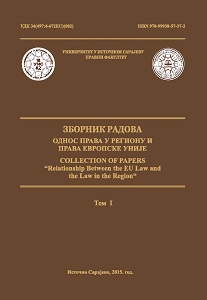Usklađivanje nacionalnih propisa Republike Srbije sa propisima EU i učešće javnosti
Harmonization of National Regulations of the Republic of Serbia with EU Regulations and Public Participation
Author(s): Maja Bobić
Subject(s): Social Sciences, Law, Constitution, Jurisprudence, Civil Society, EU-Legislation
Published by: Правни факултет Универзитета у Источном Сарајеву
Keywords: Public; Civil society organizations; European Union; Republic of Serbia; Harmonization of regulation; Transposition;
Summary/Abstract: The paper analyses the question of public participation in the procedures of harmonization of national legislation of the Republic of Serbia (RS) with the European Union’s (EU). In the first part the importance of public and civil society organizations’ participation is presented. Afterwards general rules and procedures of RS that define the legislative procedure and contain reference to the public access and participation during the preparation and adoption of the regulation or strategic documents are analyzed. In the second part, the norms that regulate the legislative procedures regarding harmonization of the national legislation with the EU legislation are discussed.More specifically, we consider the right and obligations of the law maker with regard the public participation in the legislative process. The basic presumption is that the public participation in the process of harmonization of national legislation with the EU’s is not regulated in a manner that would secure full and regular participation of all relevant stakeholders. It is estimated that non-critical transposition of the EU legal norms into the legal system of the EU, as well as lack of quality public participation in this process, may have certain negative effects regarding the efficiency of harmonization and law implementation. This is especially true where complex regulation is in question that introduces new institutes and elements of the category apparatus that the existing legal system does not know. Therefore the authors propose changes and amendments in the existing procedures that regulate preparing and adoption of law and policies.
- Page Range: 458-472
- Page Count: 15
- Publication Year: 2015
- Language: Serbian
- Content File-PDF

